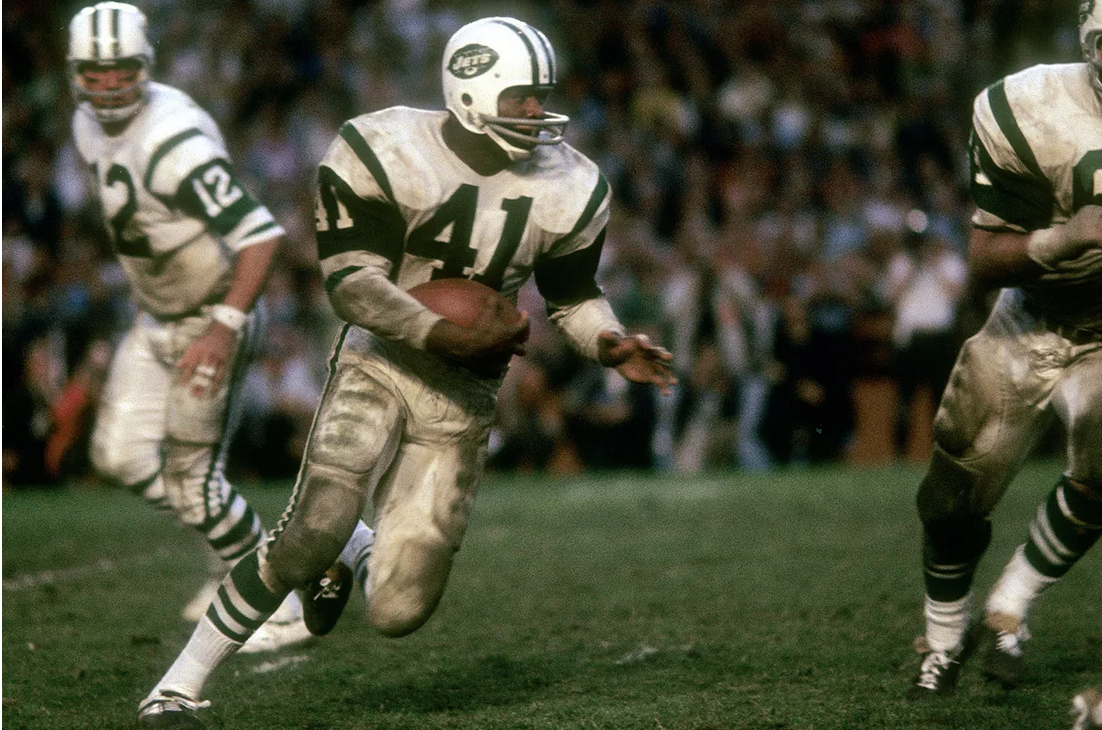Matt Snell: The Real MVP
The American Football League (AFL) was a brash, bold, and an innovative league that challenged the established National Football League (NFL) during the 1960s. Founded by Lamar Hunt in 1959, the AFL featured pass-oriented offenses, west coast teams, broadcasting innovations, and offered more opportunities to black players. The AFL successfully merged all their teams with the NFL in 1966, creating the league we know and love today. The following series of weekly articles will shine a light on the AFL’s influential people and critical moments that propelled football into popular culture, making it America’s game.
Nine and a half minutes to-go in the first half, second and goal from the Baltimore Colts four-yard line, Joe Namath sets up under center. He barks out at the line, surveying the defense, snapping the ball, dropping his right foot behind him, and hands-off left to Matt Snell. George Sauer runs a fade to the corner of the end zone, removing the Colts cornerback from run responsibilities. Emerson Boozer seals the edge, allowing Snell to reach the corner quickly. Snell grips the ball in his right hand, breaks away from a defensive back diving for his legs, and finds pay-dirt. Matt Snell's touchdown secured the AFL's first championship against the NFL, defying all odds and surprising a nation. The upstart league had finally gotten the NFL-sized monkey off its back, and it's due in large part to Matt Snell's touchdown run and performance.
Born in 1941, Matt Snell was raised in a one-square-mile town in Long Island called Carle Place, New York. The small-town kid found his way to Ohio State, where he excelled at defensive end and fullback. His superb skills on the gridiron made Snell a top prospect in the 1964 NFL and AFL Draft. The NFL's New York Giants selected Snell with the 49th pick in the fourth round. Sonny "Show Biz" Werblin, bent on acquiring talent for his New York Jets, shocked the Giants when he selected the 6'2", 219-lb running back in the first round. Werblin wanted to win on the field, but more importantly, in the press. Werblin purchased the New York Titans from Harry Wismer when he declared the franchise bankrupt. In 1963, he gathered a group of investors and founded Gotham City Football Inc., purchasing the Titans for $1 million and renaming the franchise, the Jets.
Werblin and the Mara's duked it out over Snell, taking him out to dinners and offering lucrative contracts. Years later, Snell says he signed with the Jets because the Mara's New York Giants seemed spoiled and aristocratic. Matt Snell was the first piece in Werblin's superstar puzzle. In his rookie year, Snell ran for 948 yards and five touchdowns. Snell also broke the Jets' single game rushing record with a 180-yard performance against the Houston Oilers. Snell was effective through the air, totaling 1,341 all-purpose yards, earning him an AFL All-Star nod and AFL Rookie of the Year honors. Snell notched another All-Star appearance in 1966 and 1969 and AFL First-Team All-Pro recognition in 1969.
Snell was known for his powerful running style that could break his opponents' will. The most critical opponent Snell faced was the Baltimore Colts in the 1968 NFL-AFL Championship game, where the double-digit underdog New York Jets faced off with the Baltimore Colts, led by Hall of Famers like Bubba Smith, John Mackey, and Don Shula. The Jets' game-plan was to play good defense, protect the football, and control the clock. The Colts threw four interceptions, Joe Namath did not turn the ball over, and the Jets had possession for 36 minutes and 10 seconds. Matt Snell wore down the Colts defensive unit, carrying the ball 30 times, amassing 121 yards, and averaging 4 yards a carry and a touchdown. Snell also caught four of five targets for 40 yards. The vital role played and superb stat-line collected was not enough to be named the game's Most Valuable Player. The honor went to Joe Namath, who did not throw a pass in the fourth quarter but dominated headlines the week prior after he guaranteed a Jet victory. Namath himself has said: "Matt Snell carried that game…."
Snell's Super Bowl heroics did not go unnoticed. In 1973, Miller Lite hired Snell for their first-ever television commercial. He also earned a place in the Jets Ring of Honor in 2015. Snell's Super Bowl III performance was only four years removed from the 1964 Civil Rights Act, making public discrimination based on race illegal. Perhaps the country was not ready for a black Super Bowl MVP. Regardless, Snell’s play deserved the proper recognition.

